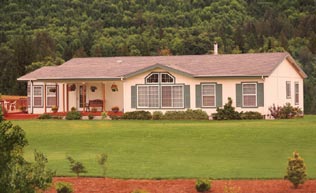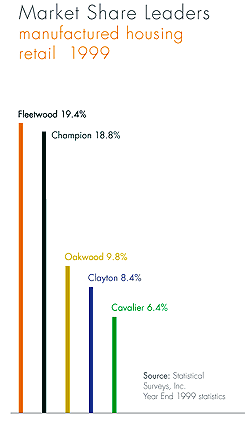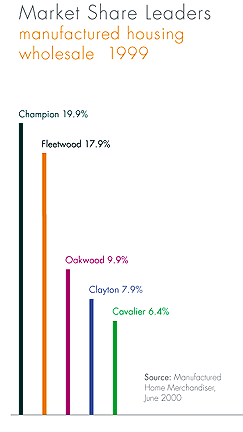
We fulfill the dream of home ownership
by providing the best housing value and customer satisfaction.
Fleetwood's strength
in both
The wholesale
and retail markets
reflects a constant
focus on product value
and quality
customer service
 |
|
Once again, retail home buyers made Fleetwood their first choice in calendar 1999. |
Manufactured Housing in Calendar 1999:
Industry Growth Pattern Interrupted
After
eight years of fairly consistent growth, manufactured housing industry
shipments slowed in calendar 1999 to 348,671 homes, 6.5 percent below the
prior year. Excessive dealer inventories and a slowdown in retail sales
constrained wholesale factory shipments, with the rate of decline in
industry shipments accelerating in the fourth quarter and in the early
months of calendar 2000. In response to years of exceptional market
growth, the industry aggressively added both manufacturing and retail
capacity, outstripping retail demand and creating an inventory imbalance.
Despite some reductions in capacity during the past year, progress in
reducing inventories has been slow, hindered by restricted availability of
retail financing and higher interest rates. Lenders have increased credit
standards and raised down payment requirements, temporarily preventing
many prospective buyers from purchasing homes. Industry retail sales,
which were down about six percent in 1999, were off 10 percent in the
first three months of calendar 2000.
Fleetwood Housing Sales Declined in a
Challenging Market Environment
Paralleling
the industry, Fleetwood's shipments to retailers in fiscal 2000 dropped
nearly 10 percent to 59,458 homes, leading to a seven percent decline in
manufacturing revenues for the housing group. Fiscal 2000 revenues of
$1.45 billion included $298 million of intercompany sales, representing
shipments of 11,768 homes to our expanding distribution chain of
Company-owned retail stores. Net manufacturing revenues, after elimination
of intercompany sales, totaled $1.16 billion, down from $1.39 billion in
fiscal 1999. A continuing favorable change in sales mix caused
multi-section homes to rise above 64 percent of housing unit sales, up
from 58 percent in the prior year. The lower housing shipments and
revenues led to a 17 percent drop in segment operating income (before
intercompany profit elimination) from $100 million to $84 million, and a
decline in operating margin from 6.4 percent to 5.8 percent of sales.
 |
|
Fleetwood Homes is a proud sponsor of Neil McCoy's 24•7•375 Tour. |
Fleetwood Again Led the
Industry in
Retail Market Share
Capitalizing on the
strength of our independent and Company-owned retail network, we captured
19.4 percent of the national manufactured housing retail market in
calendar 1999. This placed Fleetwood in the number one industry position
for the 12th consecutive year — an achievement taking on even greater
significance considering it was accomplished with fewer than half the
distribution points of our nearest competitor. The efficiency per
distribution point is a key measure and a meaningful gauge of the quality
of our retail network. Our efforts in recent years to replace lost retail
capacity and upgrade the retail distribution network have paid off
handsomely. In calendar 1999, these efforts resulted in an uptick in
wholesale market share from 17.7 percent to 17.9 percent, placing us in a
strong second position among the nation's largest producers of
manufactured housing.
Pinnacle Program Encourages Exclusive
Retailer Relationships
Fleetwood has long been
at the forefront of the manufactured housing industry in developing
exclusive retailer relationships. Today, 53 percent of our retailer
locations sell Fleetwood products exclusively. Our belief that these
partnerships benefit both parties is supported by recent statistics
indicating that retailers who sell Fleetwood products exclusively generate
17 percent more sales than the average non-exclusive Fleetwood retailer.
To capitalize on this, we further encouraged exclusivity in January 2000
by launching the Fleetwood Homes Pinnacle Retailer Program. Under this
program, dedicated Fleetwood retailers receive unparalleled marketing
support to drive traffic, identify customer leads and increase sales.
Other benefits include funding for retailer signage, preferred product
delivery schedules and preferential treatment from national lenders and
suppliers. Also, we make our sales and marketing training courses
available to Pinnacle retailers at a significantly lower cost. All of
these Pinnacle benefits enable exclusive Fleetwood retailers to more
effectively serve the needs of our mutual retail customers.
 Fleetwood Introduces
Fleetwood Introduces
Industry's First Two-Year
Warranty
Reflecting our commitment to provide
the best housing value to our customers, we introduced the industry's
first two-year home warranty on March 1, 2000. We recognize that buying a
home is a huge decision and a major financial commitment, and want
Fleetwood homebuyers to know they will be cared for beyond the date of
purchase. When we asked customers what they wanted in a warranty, they
told us to "cover it all and do it longer than anyone else." Fleetwood's
warranty thus sets a new standard for the manufactured housing industry,
providing comprehensive coverage for plumbing, heating and electrical
systems, as well as all structural components, for a full two years from
the date of sale. The warranty also covers all factory-installed
appliances. All warranty repairs and replacements are free, with no
homeowner responsibility for deductibles or service charges. We've gone a
step further by adding convenient, one-call service to our toll-free
hotline: one call takes care of everything, including the coordination of
repairs to factory-installed appliances. We're so confident in the quality
of our homes that we didn't hesitate to take the bold step to extend our
warranty coverage, providing assurance that our customers' investment is
secure in a Fleetwood home.
 |
|
Through attractive retail home centers, Fleetwood offers consumers a favorable home buying experience. |
Population Trends Projected
to
Drive Increase in Housing Demand
Looking ahead to the next
decade and beyond, it is expected that steady population growth and
favorable demographics will continue to drive increases in national
housing demand. The U.S. Census Bureau projects the population to grow at
an average annual rate of 2.4 million people over the next 15 years.
During the same time period, the population segment accounting for the
most household formations, those aged 25 to 64, will increase by about 1.1
million per year. In addition, net immigration is expected to remain high,
adding more than 800,000 new residents to the population each year. Based
on these population trends, it is projected that the number of U.S.
households will increase by 1.1 to 1.2 million annually through the next
decade, fueling a need for as many as 1.5 million new homes a year. More
than half of the projected population growth in the 25 to 64 age group is
expected to be in five key states: California, Texas, Florida, Georgia and
Washington. These are vital markets for the manufactured housing industry
and for Fleetwood, both of which have ample production capacity in these
geographic areas.
In recent years, the rate
of home ownership has accelerated to an all-time high, reaching more than
two-thirds of American households. Because of the superior value offered
by manufactured housing, the industry has played a significant role in
filling the increased demand, accounting for almost 28 percent of all new
single family homes sold in calendar 1999. That number is likely to grow,
given that manufactured homes offer quality shelter at less than half the
cost per square foot of a site-built home. Since much of the recent
employment growth is occurring in the moderate-paying service sector,
affordable manufactured housing increasingly provides an opportunity for
home ownership for families that otherwise would be priced out of the
market. Clearly, manufactured housing will continue to play a critical
role in satisfying the nation's growing need for housing. And with 50
years of experience in providing quality housing to America's families,
Fleetwood promises to be an integral part of this industrywide effort for
many years to come.

